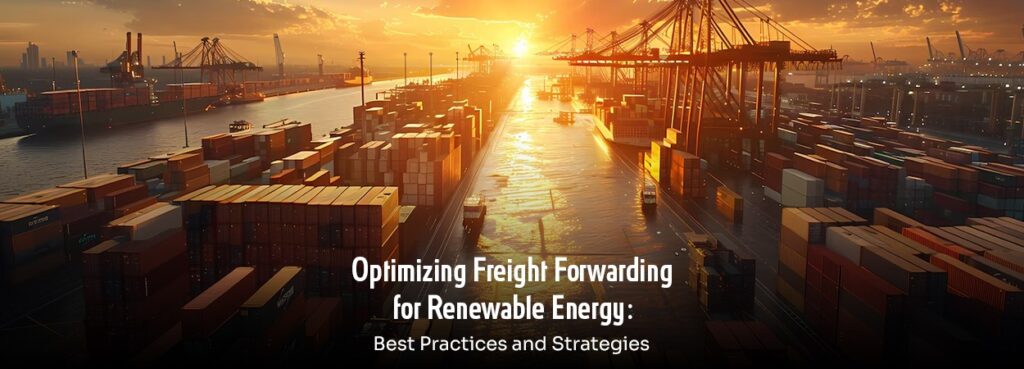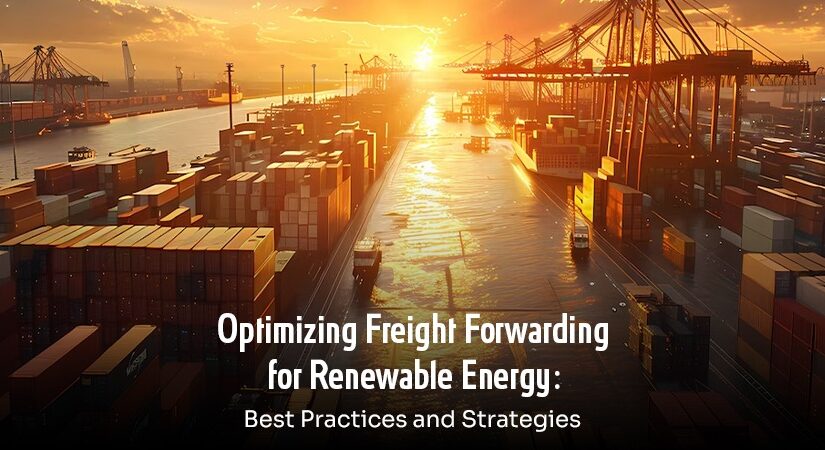
The renewable energy sector is growing rapidly across the globe, driven by the urgent need for sustainable power solutions. As solar panels, wind turbines, and other green technologies are deployed on a large scale, efficient logistics play a vital role in ensuring the timely and cost-effective delivery of critical components.
Freight forwarding establishes itself as the essential connection between renewable energy supply chain operations by handling the transportation of oversized, sensitive, high-value cargo between international borders. Businesses can achieve shipping operation optimization for renewable energy projects through proper strategies that control costs and risks.
The Role of Freight Forwarding in Renewable Energy
Heavy and unconventional cargo forms a common element in renewable energy infrastructure projects. Wind turbine blades reach lengths exceeding 50 metres, so they need specialised transportation methods. Moving solar panels requires special handling to avoid any damage to their components. A professional freight forwarding company guarantees safe delivery of all components while meeting global regulations and delivering them on time.
The international scope of renewable energy projects requires international freight forwarding services because suppliers, and manufacturers, and project sites exist across different nations. The process combines coordination with documentation, and customs clearance, and real-time tracking to deliver goods from one global region to another.
Key Challenges in Freight Forwarding for Renewable Energy
The transportation of renewable energy components presents specific difficulties to overcome. These include:
- Oversized cargo: Special permits, together with handling equipment, and route planning become mandatory for this operation.
- Remote project locations: Renewable energy installations typically exist in remote locations, including desert areas, and mountainous regions, as well as offshore sites, which are distant from standard logistics centres.
- Tight project timelines: Project delays because of delivery delays lead to increased costs for the entire project.
- Environmental concerns: The logistics operations need to follow the sustainable objectives of renewable energy programmes.
Businesses need to partner with a trustworthy freight forwarding company that specialises in complex and high-stakes project management.
Best Practices for Optimised Freight Forwarding
- Early Planning and Collaboration
A successful renewable energy logistics operation begins with proper planning. Project managers need to engage freight forwarding service providers at the beginning of their project development phase. The early involvement of freight forwarding services enables risk anticipation, permit acquisition, and schedule synchronisation with production schedules.
The joint work between project engineers and logistics teams at project initiation enables both component design for transport ease and delivery segment planning.
- Customised Transport Solutions
Each renewable energy project possesses unique shipping requirements that differ from other projects. Freight forwarders need to develop customised solutions, which include vessel chartering for offshore wind turbine transport and desert location final delivery.
The combination of route optimisation software with weather forecasting and GPS tracking enables contemporary freight forwarding service providers to achieve precise and efficient transit operations.
- Risk Management and Insurance
Due to the expensive nature of renewable energy equipment, proper insurance coverage, together with contingency plans, should be considered essential. The delivery schedule can be interrupted by unexpected occurrences, including port strikes, extreme weather conditions, and customs delays. A reliable freight forwarding company delivers full risk evaluation services, insurance assistance and backup transportation solutions to reduce delivery interruptions.
- Compliance and Documentation
The process of international trade demands complete awareness of import-export rules, together with customs protocols, and official documentation requirements. International freight forwarding experts guide companies through complex international laws by verifying all documentation remains precise and complete.
Inadequate documentation or missing information leads to border delays that create expensive shipping delays. Working with a freight forwarder who possesses strong network connections and local law expertise is essential.
- Commitment to Sustainability
Renewable energy organisations now actively monitor their operational environmental footprint, which includes their logistics activities. Freight forwarders help renewable energy companies reach their sustainability targets through sustainable transportation solutions, shipment consolidation practices, and energy-efficient equipment deployment.
Freight forwarding company partners who integrate sustainability values into their services help the renewable energy brand build credibility and an eco-friendly brand reputation.
Conclusion
The leading role of renewable energy in global development requires efficient logistics operations to be of paramount importance. The successful completion of project milestones depends on a dependable freight forwarding service, which provides prompt, secure, and well-organised cargo transportation.
The renewable energy sector requires specialised optimization of all stages, from planning through packaging and transport to delivery. The implementation of proper international freight forwarding strategies enables businesses to minimise costs and delays to support a sustainable future through logistics systems with equal efficiency to their energy delivery capabilities.

